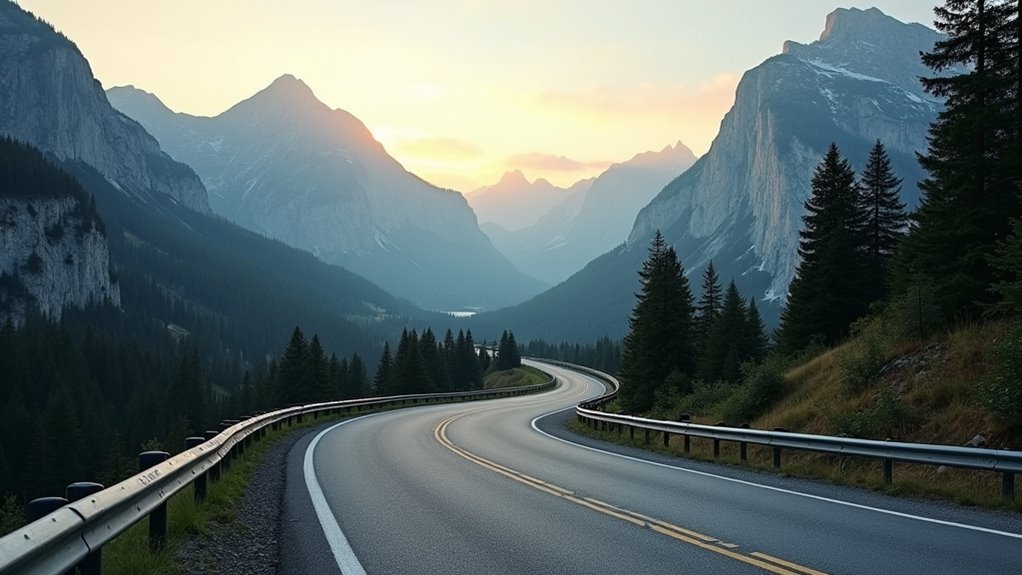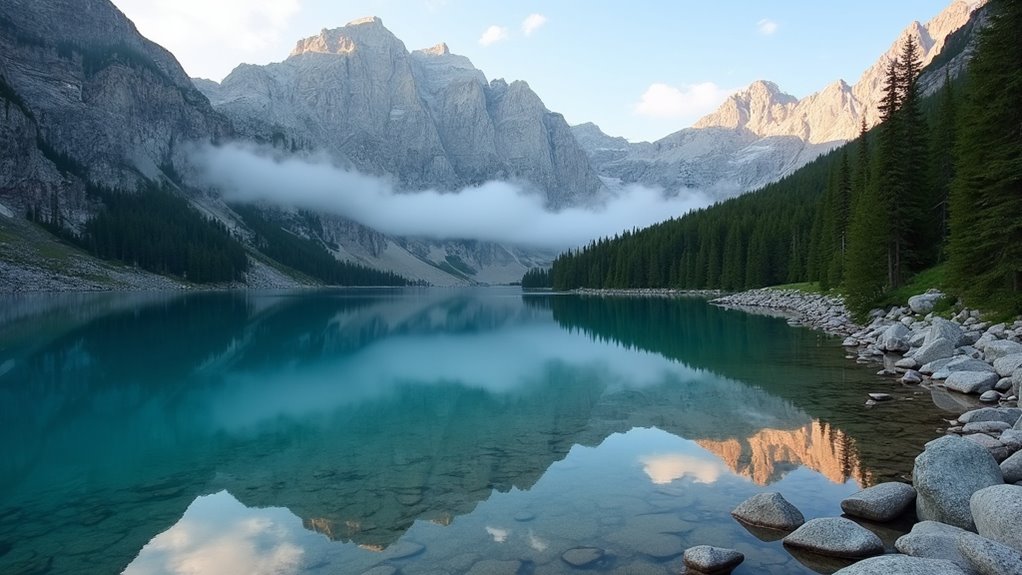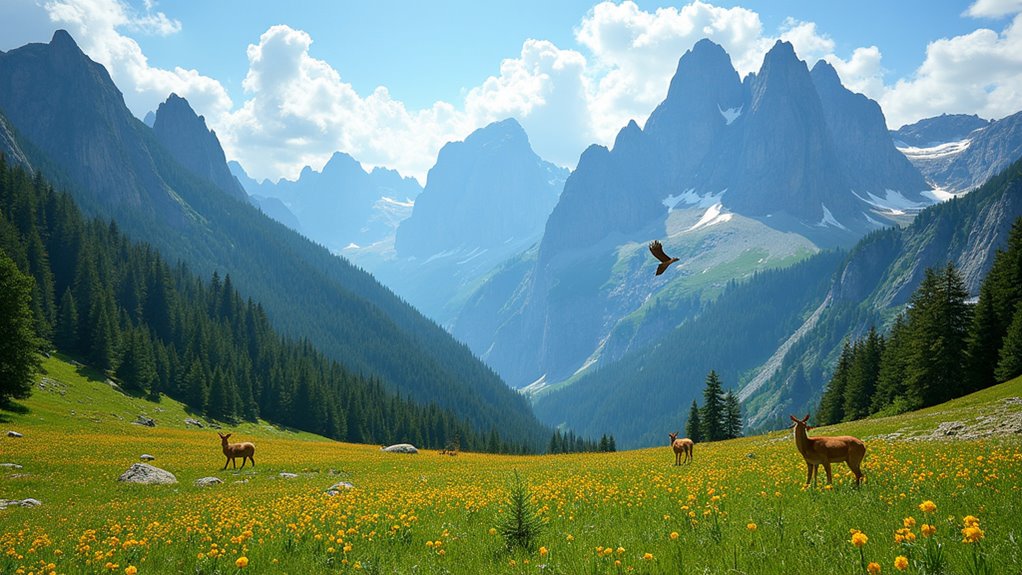Physical Address
304 North Cardinal St.
Dorchester Center, MA 02124
Physical Address
304 North Cardinal St.
Dorchester Center, MA 02124

Curious why Montenegro's Durmitor National Park rivals the Swiss Alps at half the cost while remaining Europe's hidden gem?
What if you could experience Switzerland’s dramatic alpine beauty without the crushing expense? You’ll find that answer in Montenegro’s Durmitor National Park, where towering peaks pierce the sky and glacial lakes mirror ancient forests—all at a fraction of Western Europe’s costs. While most travelers chase crowded destinations, you’re about to discover why seasoned adventurers consider this rugged wilderness one of Europe’s best-kept secrets, complete with specific strategies that’ll maximize your experience while minimizing your budget.

While Durmitor National Park sits in Montenegro’s remote northern mountains, you’ll find several practical routes to reach this UNESCO World Heritage site without breaking your travel budget.
The most common approach is flying into Podgorica Airport, then taking a bus to Žabljak town for about €8-12. This 2.5-hour journey offers stunning mountain views.
Alternatively, rent a car at the airport for around €25-35 daily, giving you flexibility to explore surrounding areas.
From coastal cities like Budva or Kotor, direct buses run to Žabljak during summer months for €15-20.
If you’re driving from Serbia or Bosnia, use the well-maintained roads through Pljevlja.
Once in Žabljak, local minibuses and taxis connect you to park entrances and trailheads affordably.
For those planning to camp within the park’s dense forest areas, consider packing a jungle hammock as an elevated sleeping solution that keeps you off the damp ground and away from crawling insects.
Once you’ve reached Žabljak, the real adventure begins with Durmitor’s network of hiking trails that cater to every skill level and budget. You’ll find well-marked paths leading to Bobotov Kuk, Montenegro’s highest peak at 2,523 meters.
For budget hikers, pack your own lunch and water – there aren’t many facilities on trails.
The Black Lake circuit offers an easy 3.5-kilometer walk perfect for families, while experienced climbers can tackle the challenging Prutas or Savin Kuk routes.
You’ll need proper hiking boots and weather-appropriate gear, as conditions change rapidly at altitude.
Don’t attempt solo climbs without local knowledge. Hiring a guide costs €30-50 daily but guarantees safety and reveals hidden viewpoints you’d otherwise miss completely.
Before setting out on any trail, ensure you have essential camping gear if you plan to spend the night in the mountains, as proper preparation can make the difference between an unforgettable adventure and a challenging ordeal.

Beyond the rugged peaks and challenging trails, Durmitor’s 18 glacial lakes offer some of Europe’s most pristine alpine scenery without the crowds you’ll find in Switzerland or Austria.
Black Lake (Crno Jezero) sits just 3km from Žabljak town center, making it your most accessible option. You’ll reach it via an easy 30-minute walk through pine forests. The lake’s dramatic backdrop of towering limestone cliffs creates perfect photo opportunities year-round.
Top glacial lakes to prioritize:
Pack lunch and plenty of water since you won’t find vendors at remote locations. When planning overnight stays near these remote lakes, research campsite selection factors including proximity to water sources, terrain stability, and local regulations before setting up camp.
From Durmitor’s serene alpine lakes, shift your adventure into high gear at Tara River Canyon, where Europe’s deepest gorge cuts 1,300 meters through Montenegro’s wilderness. You’ll find world-class white-water rafting here without breaking the bank – half-day trips start around €35, while full-day adventures cost €50-70.
The Tara’s emerald waters rush through dramatic limestone cliffs, creating Class II-IV rapids perfect for beginners and experienced rafters alike. You’ll navigate 18 kilometers of pristine wilderness, passing under the iconic Đurđevića Tara Bridge.
Book with local operators in Žabljak for better prices than tourist agencies. Bring quick-dry clothes and waterproof bags for valuables. Spring snowmelt creates the most exciting conditions, though summer offers warmer, family-friendly flows. Don’t miss this UNESCO-protected canyon experience.
For those seeking a multi-day wilderness experience, consider renting an RV to explore Montenegro’s rugged terrain at your own pace while having comfortable accommodations nearby.

While white-water thrills get your adrenaline pumping, Durmitor’s real treasure lies in its incredible biodiversity that spans three distinct climate zones. You’ll encounter alpine meadows, dense forests, and Mediterranean vegetation—all within hiking distance of each other.
Pack your binoculars and camera because you’re likely to spot some remarkable wildlife:
The park’s glacial lakes support unique aquatic ecosystems, while ancient pine forests shelter wolves and lynx.
Budget tip: early morning hikes offer the best wildlife viewing opportunities without expensive guided tours. Make sure to bring camping gear if you plan to extend your wilderness exploration with an overnight adventure under Montenegro’s pristine mountain skies.
Your Durmitor adventure hinges on timing since this mountain wilderness transforms dramatically with each season. Summer (June-August) offers perfect hiking weather with temperatures reaching 20°C, but expect crowds and higher accommodation prices.
You’ll find the best value during shoulder seasons—May and September provide mild weather, fewer travelers, and budget-friendly lodging rates.
Winter transforms Durmitor into a snowy playground ideal for skiing and snowshoeing, though you’ll need proper gear and should book accommodation early.
Spring brings unpredictable weather with possible snow until May, making some trails inaccessible.
For budget travelers, avoid July-August peak season.
October offers stunning autumn colors and rock-bottom prices, though weather becomes increasingly unpredictable.
Always pack layers regardless of season—mountain weather changes rapidly. Implementing stress-free camping techniques can help you better prepare for Durmitor’s changing conditions and enhance your overall wilderness experience.

Since Durmitor’s remote location means limited accommodation choices, you’ll want to book ahead during peak season. Žabljak serves as the main base camp for park visitors, offering everything from budget hostels starting at €15 per night to mid-range guesthouses around €40-60.
Your accommodation options include:
Consider staying in nearby Plužine or Trsa for alternative options if Žabljak’s fully booked. If you’re planning to camp with your pet, make sure to follow proper camping etiquette to ensure an enjoyable experience for all visitors and wildlife in the park.
Picture yourself watching the sunrise paint Bobotov Kuk’s jagged peaks in golden hues while sipping coffee from your budget camping setup. You’ll find Durmitor’s raw beauty doesn’t require deep pockets—just sturdy boots and an adventurous spirit. Whether you’re exploring crystal-clear lake reflections or feeling Tara River’s spray on your face, this Montenegrin gem delivers unforgettable experiences without breaking the bank. Pack light, plan smart, and let Durmitor’s wilderness transform your perspective on Europe’s hidden treasures.